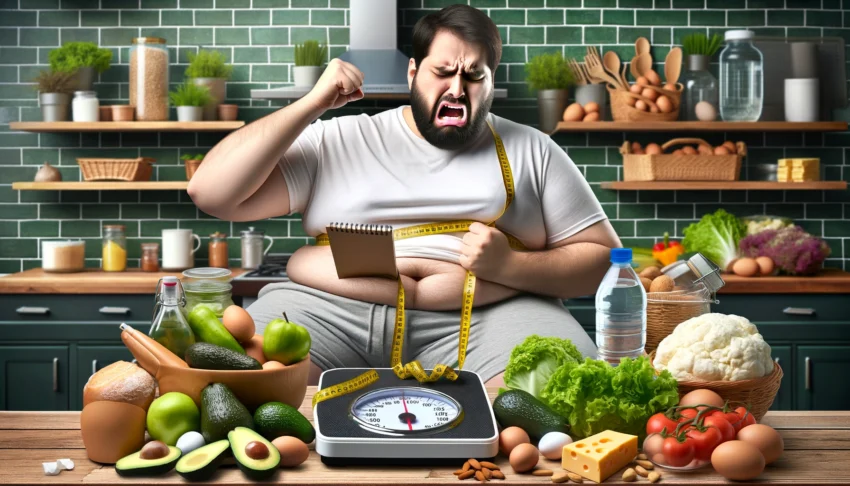The ketogenic (keto) diet has gained immense popularity as a weight-loss strategy, primarily due to its unique approach of reducing carbohydrate intake and increasing fat consumption. While many people have experienced success with this diet, others find themselves struggling to shed pounds despite strict adherence to the keto regimen. Understanding the nuances of why weight loss might stall on the keto diet involves exploring the role of water weight, the necessity of a calorie deficit, and the impact of fiber on digestive health.
The Initial Water Weight Loss
One of the most notable aspects of the keto diet is the rapid weight loss many experience in the initial stages. This quick drop on the scale can be highly motivating, but it’s important to recognize that much of this initial loss is due to water weight, not fat.
When you significantly reduce your carbohydrate intake, your body begins to use up its glycogen stores. Glycogen, the stored form of glucose, is held in the liver and muscles, and for every gram of glycogen stored, approximately three grams of water are stored with it. Thus, when glycogen is depleted, the water associated with it is also lost. This explains the quick weight drop many see when starting keto, but it’s crucial to understand that this is not the same as losing body fat.
The Importance of a Calorie Deficit
For sustained weight loss, a calorie deficit is essential. No matter the diet, including keto, the basic principle of weight loss revolves around burning more calories than you consume. While keto can help suppress appetite and reduce overall calorie intake for some, it’s not a guarantee for everyone.
The high fat content of the keto diet can be very calorie-dense. Fats contain about 9 calories per gram, compared to 4 calories per gram for carbohydrates and proteins. Without careful monitoring, it’s easy to consume more calories than needed, even if the diet is low in carbs. This can lead to a situation where, despite being in ketosis (a state where the body burns fat for fuel), you are still not losing weight because your overall caloric intake exceeds your expenditure.
The Role of Fiber in Weight Loss and Health
Another critical factor that can influence weight loss on the keto diet is fiber intake. Carbohydrates are a significant source of dietary fiber, which is essential for healthy digestion. On a strict keto diet, where carb intake is significantly reduced, fiber intake often drops as well. This reduction can lead to slower bowel movements and constipation, which not only impacts comfort and daily wellbeing but can also affect weight loss efforts.
How Lack of Fiber Affects Your Body
- Slowed Bowel Movements:
Reduced fiber intake can slow down bowel movements, leading to constipation. This is a common issue for many on the keto diet and can cause bloating, discomfort, and a general feeling of sluggishness. Constipation can also lead to water retention and a temporary increase in weight, further masking any fat loss that might be occurring. - Gut Health:
Fiber plays a crucial role in maintaining a healthy gut microbiome. A diet low in fiber can negatively impact gut bacteria, leading to digestive issues and potentially more severe long-term health problems. A healthy gut is essential for overall health, including effective digestion and nutrient absorption. - Nutrient Absorption:
Poor fiber intake can also affect the body’s ability to absorb nutrients from food. Even if you are consuming enough vitamins and minerals, your body might not be absorbing them efficiently, which can impact your overall health and weight loss efforts.
Practical Tips to Overcome These Challenges
If you find yourself struggling to lose weight on the keto diet, consider the following tips to address these common issues:
- Monitor Calorie Intake:
Use a food diary or a calorie tracking app to ensure you are in a calorie deficit. Be mindful of the high caloric content of fats and try to balance your meals to avoid overeating. - Increase Fiber Intake:
Incorporate high-fiber, low-carb vegetables into your diet. Foods like avocados, broccoli, and chia seeds are excellent sources of fiber that can help improve bowel movements and overall digestive health. - Stay Hydrated:
Adequate water intake is essential, especially as your body adjusts to the lower carb intake and the associated loss of water weight. Drinking enough water can help alleviate constipation and improve overall bodily functions. - Exercise Regularly:
Physical activity can boost your metabolism and help create a calorie deficit. It also supports digestive health and can help mitigate some of the negative effects of reduced fiber intake. - Consider Supplements:
If you’re struggling to get enough fiber from your diet, consider fiber supplements. However, it’s best to try to meet your nutritional needs through whole foods whenever possible.
Conclusion
The keto diet can be an effective tool for weight loss, but it’s not without its challenges. Understanding that initial weight loss is largely due to water weight, recognizing the necessity of a calorie deficit, and addressing the potential fiber deficit are all crucial for long-term success. By making mindful adjustments to your diet and lifestyle, you can overcome these hurdles and work towards your weight loss goals more effectively. Remember, every individual is different, and it’s essential to find a balanced approach that works best for your body and your health.

